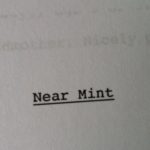As much as I dislike transcribing interviews, it’s a necessary evil to ensure accurate quotations. It helps me organize my thoughts before writing articles. It’s also made me a better dialogue writer.
Listening to someone speak is one thing. Transcribing their words is another. Transcribing forces you to understand not just what they’re saying, but how they’re saying it.
Accents, idioms, slang. Those things—along with education, profession, and geographic location—combine to create unique voices for every individual. While my sister and I are “voice twins,” anyone who knows both of us can tell us apart by our word choices and the fact that my sister tends to absorb the accents of people around her. (After visiting her in-laws in Canada she returns sounding more Canadian than her husband.)
A few months ago, when interviewing a British woman who executive produces two reality competition series, I couldn’t help but think I was speaking with a British friend of mine. The woman I was speaking with sounded more like my friend than my friend’s sister does. At the end of the interview I asked the interviewee if she happened to grow up in the Wimbledon area of London. She laughed, said she was born in Wales but when she was very young her family moved to a home about five miles outside of Wimbledon, where she grew up. My friend—and her sister whose accent is quite different—also grew up about five miles from Wimbledon.
Because transcribing interviews forces you to really pay attention to how people speak, not just what they say, it can help you craft more realistic dialogue in your creative work. I know it helps me.

I realized that recently when I received an audio recording of a group of actors reading of my short play, Near Mint. Take a listen:
This cold reading of Near Mint was done by a play reading group in Trumansburg, New York. Cast: Scott Dawson, Michele Mitrani, Colleen Coffey, Anne Bialke, and Rachel Kennedy. Thank you all!
One thing to remember: while accuracy is crucial when quoting an actual person, being too accurate can be boring for a story, book, or script. If you transcribe a conversation or two you’ll see actual speech is usually filled with ums, ers, and run-on sentences. As a fiction writer, you get to polish each line to perfection.
